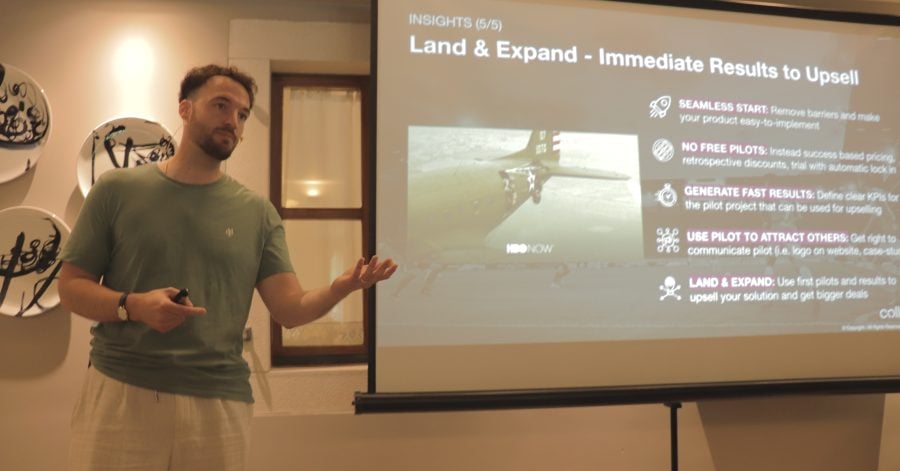The Recursive recently had the pleasure of attending the inaugural Hellen’s Rock Capital Founder Retreat in Meneghetti, Croatia, from June 1st to 4th. The retreat’s theme was “How Mindsets and Strategies Enable Founders to Build Great Companies,” and The Recursive founders, Irina Obushtarova and Etien Yovchev, engaged in enlightening conversations with over 30 accomplished founders. One of them, David Geisser, CEO of collectID, shared valuable insights about business development for startups and innovative products based on his personal experience.
CollectID’s mission is to bridge the gap between brands and consumers, enabling sports and fashion businesses to connect with their customers more effectively. By creating digital twins of various products (e.g. T-shirts), the company enables a new communication channel fostering direct brand-to-consumer interaction and unlocking new experiences for fans. However, the sale of such a complex and novel product is usually quite challenging, especially when many stakeholders are involved in the decision-making process.
To navigate this, David worked a lot to figure out what works and leaned heavily on building personal relationships, which are particularly important in the sports industry, where collectID had already collaborated with big names like Hugo Boss, McLaren Racing, Atlético Mineiro, and the Nashville Predators (NHL) among other popular brands.
B2B Marketing on Social Media Isn’t That Different from B2C Marketing
One important takeaway from David’s talk was his observation that an effective marketing communication should revolve around one clear message to avoid confusing the audience. “You have people’s attention for 2-3 seconds,” he further noted, emphasizing the importance of brevity and the power of visual content, like videos and images, in driving high engagement.
“Furthermore, people tend to follow individuals, not corporations, which makes personalized and interactive content crucial. Sharing personal experiences, even failures, is a means for humanizing the brand,” David shared.
Personal Relations Are Key to Accessing an Industry
Next, while obvious, David advocated for networking. “Build a strong network of industry experts, go out and talk to people, join events, be open,” he advised. Identifying key enablers or advisors in the industry could help tap into new opportunities.
He cited a creative approach that his team used to network with billionaires in the sports industry: “Earlier this year in February we were at the All Star NBA Weekend in Salt Lake City. We couldn’t afford to go into all of the secret areas where the billionaires spend their time. So, we went to the most expensive hotel in town and drank coffee in the lobby – and whenever we saw an owner of an NBA franchise, we’d go to them and show them how our product worked.”
David further advised creating an attractive incentive structure to engage your enablers. “I’d avoid fixed retainers and big upfront costs. You need a structure where if you win, they win,” he pointed out.
First Contact Is Crucial – You Only Get One First Impression
“When I meet someone for the first time, I try to ask many questions and really listen,” David said. This practice helped him understand their specific problems, enabling him to tailor his pitch to their context.
His strategy centers on getting to the point, being visual and tangible, and creating a co-creating environment. ” If I had a half an hour meeting, I’d try to speak for no more than 7-10 minutes. When potential customers start brainstorming with you about what they can do is always better than them just listening and not participating,” he explained.
Building and Understanding the Stakeholder Map
David also emphasized the importance of identifying and mapping key stakeholders in an organization, including decision-makers, influencers, champions, and road blockers. Especially, in corporate environments, you can have at least 5-6 people involved in deciding whether to work with you or not.
According to him, it’s essential to understand the individual incentives of these stakeholders and communicate correspondingly in order to navigate corporate structures successfully.
Land & Expand – Start Small and Leverage First Results to Upsell
“It’s almost impossible to start with a big deal in a big corporation. So we try to just get in and reduce the barriers as much as possible. Then, we can show traction in the company and upsell,” David said.
He insisted on avoiding free pilots and recommended success-based pricing, retrospective discounts, or trials with automatic lock-ins instead. The aim is to demonstrate value rapidly, define clear KPIs, and use those results to upsell and attract other potential customers.








